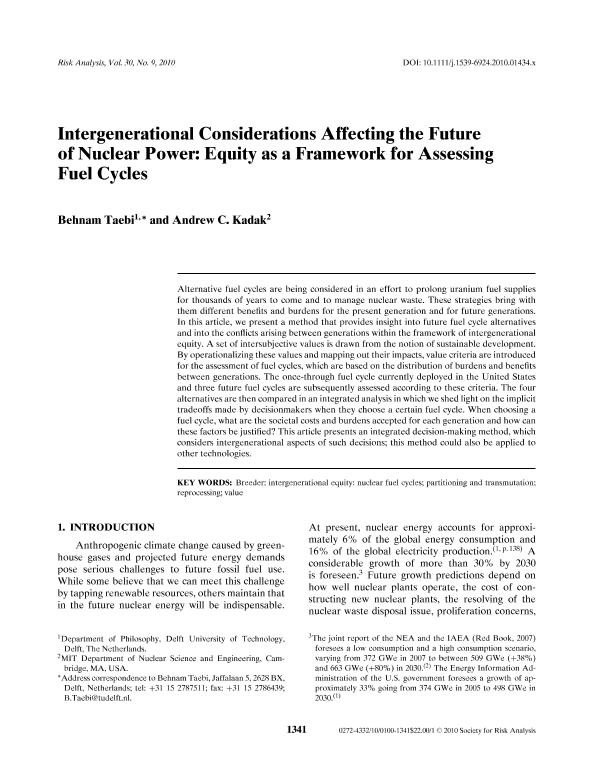Intergenerational considerations affecting the future of nuclear power : equity as a framework for assessing fuel cycles

Contenido multimedia no disponible por derechos de autor o por acceso restringido. Contacte con la institución para más información.
| Tag | 1 | 2 | Value |
|---|---|---|---|
| LDR | 00000cab a2200000 4500 | ||
| 001 | MAP20100079010 | ||
| 003 | MAP | ||
| 005 | 20120216112024.0 | ||
| 008 | 101007e20100906esp|||p |0|||b|spa d | ||
| 040 | $aMAP$bspa$dMAP | ||
| 084 | $a7 | ||
| 100 | $0MAPA20100052525$aTaebi, Behnam | ||
| 245 | 0 | 0 | $aIntergenerational considerations affecting the future of nuclear power$b : equity as a framework for assessing fuel cycles$cBehnam Taebi and Andrew C. Kadak |
| 520 | $aAlternative fuel cycles are being considered in an effort to prolong uranium fuel supplies for thousands of years to come and to manage nuclear waste. These strategies bring with them different benefits and burdens for the present generation and for future generations. In this article, we present a method that provides insight into future fuel cycle alternatives and into the conflicts arising between generations within the framework of intergenerational equity. A set of intersubjective values is drawn from the notion of sustainable development. By operationalizing these values and mapping out their impacts, value criteria are introduced for the assessment of fuel cycles, which are based on the distribution of burdens and benefits between generations. The once-through fuel cycle currently deployed in the United States and three future fuel cycles are subsequently assessed according to these criteria. The four alternatives are then compared in an integrated analysis in which we shed light on the implicit tradeoffs made by decisionmakers when they choose a certain fuel cycle. When choosing a fuel cycle, what are the societal costs and burdens ccepted for each generation and how can these factors be justified? This article presents an integrated decision-making method, which considers intergenerational aspects of such decisions; this method could also be applied to other technologies | ||
| 650 | 1 | $0MAPA20080601218$aEnergías no nucleares | |
| 650 | 1 | $0MAPA20080570491$aRiesgo nuclear | |
| 650 | 1 | $0MAPA20080588953$aAnálisis de riesgos | |
| 650 | 1 | $0MAPA20080591182$aGerencia de riesgos | |
| 700 | 1 | $0MAPA20100052518$aKadak, Andrew C. | |
| 773 | 0 | $wMAP20077000345$tRisk analysis : an international journal$dMcLean, Virginia : Society for Risk Analysis, 1987-2015$x0272-4332$g06/09/2010 Tomo 30 Número 9 - 2010 , p. 1341-1362 |

